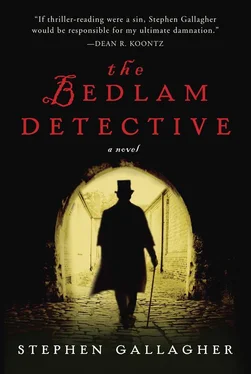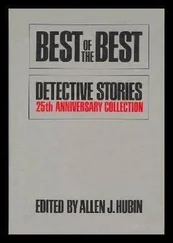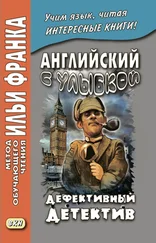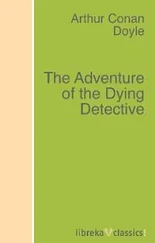Stephen Gallagher - The Bedlam Detective
Здесь есть возможность читать онлайн «Stephen Gallagher - The Bedlam Detective» весь текст электронной книги совершенно бесплатно (целиком полную версию без сокращений). В некоторых случаях можно слушать аудио, скачать через торрент в формате fb2 и присутствует краткое содержание. Жанр: Исторический детектив, на английском языке. Описание произведения, (предисловие) а так же отзывы посетителей доступны на портале библиотеки ЛибКат.
- Название:The Bedlam Detective
- Автор:
- Жанр:
- Год:неизвестен
- ISBN:нет данных
- Рейтинг книги:5 / 5. Голосов: 1
-
Избранное:Добавить в избранное
- Отзывы:
-
Ваша оценка:
- 100
- 1
- 2
- 3
- 4
- 5
The Bedlam Detective: краткое содержание, описание и аннотация
Предлагаем к чтению аннотацию, описание, краткое содержание или предисловие (зависит от того, что написал сам автор книги «The Bedlam Detective»). Если вы не нашли необходимую информацию о книге — напишите в комментариях, мы постараемся отыскать её.
The Bedlam Detective — читать онлайн бесплатно полную книгу (весь текст) целиком
Ниже представлен текст книги, разбитый по страницам. Система сохранения места последней прочитанной страницы, позволяет с удобством читать онлайн бесплатно книгу «The Bedlam Detective», без необходимости каждый раз заново искать на чём Вы остановились. Поставьте закладку, и сможете в любой момент перейти на страницу, на которой закончили чтение.
Интервал:
Закладка:
The driver closed the car door behind him. Sebastian started toward the buildings alone.
Before he’d taken more than a few strides, a young woman came out. She wore a full skirt and a man’s jacket buttoned up tight, and her hair was so long and unkempt that it seemed so by intent rather than neglect.
Grace Eccles, he assumed. She had a rock in her hand.
She said, “This is my house. You come no closer.”
Sebastian stopped.
“How close would be acceptable?” he said.
“I prefer you fuck off and far away, sir, and here’s the proof of it.”
He might have been shocked by her language, had she given him the chance to react. But she did not.
It was a good throw, overarm and with force in it. And accurate, too. It would have laid him out flat if he hadn’t turned side-on and dodged it. It missed his head by a whisker. It missed the driver by more, but went on to smash through the Daimler’s side window like a marble fist.
Whereupon the driver emitted a loud oath that was almost as foul as her own and scrambled to get back to the wheel of his vehicle. He crashed the gears in his haste to reverse up the track to a place of greater safety; and as the wheels spun and the Daimler slid around in its retreat, Sebastian remembered to look toward Grace Eccles in case there might be another rock coming.
But she was watching the car’s departure with visible satisfaction.
Sebastian said, “That was uncalled for.”
“Whatever you say,” Grace Eccles replied. “How many motorcars can you muster? I’ve no end of stones.”
With the aim of catching her unawares, Sebastian said, “I’m here on serious business. Two young girls were found dead on the estate yesterday.”
She showed no particular reaction. She kept on looking at the car for a while, and then she looked at him.
“What’s that to me?” she said.
“I thought you might be concerned to hear it.”
She did no more than shrug.
“Can I ask you something?”
“You can ask.”
Sebastian said, “What happened to you and Evangeline Bancroft? And why will no one speak of it?”
“I know why you’re here,” she said, ignoring his question. “Tell him I don’t care who he sends. This was my father’s house, and now it’s mine. I’ve a piece of paper that a judge has looked at, and here I stay.”
“I don’t know what you’re talking about.”
“Then where’s the point in you standing there and listening to me?”
She turned her back on him, walked across the yard and into her house, and slammed the door.
In that moment it was as if she’d walked out of the world completely; the house sat like a dead thing, abandoned and unlived in.
Sebastian waited.
Then he turned away and walked up the track to the car. The driver was beside it, pulling glass out of the door frame and examining his coachwork for further damage.
As Sebastian drew close, the driver looked up angrily and said, “How stupid was that? As if I didn’t warn you.”
“I know,” Sebastian said. “Forgive me. I never listen.”
He swept broken glass from the leather seat, and they continued their journey. The remainder of it was undertaken in silence-or as close to silence as could be achieved, save for the noise of the car’s engine and the wind that whistled in through the broken window.
The car might be damaged. But not so damaged, Sebastian thought, as the young woman who’d thrown the rock at it.
Owain Lancaster had been born the son of a Welsh corn merchant. As a young man he’d been sent away to study the law in Manchester, but an interest in science and engineering had prevailed, particularly in its application to long-range artillery. He’d sold the rights to his first arms patent, an improved breech-sliding mechanism for field guns, for thirty pounds. After seeing how much money it made for its new title holders, he never signed away another.
He’d risen to own foundries and factories and a shipyard, and had bought Arnside Hall and its estate from a bankrupt family some twenty-five years before. He’d meant it for a summer retreat and had spent a considerable amount on rebuilding the house and installing the most modern conveniences: ducted heating, electricity from its own plant, the first telephone in the county. Now he’d sold his London house and lived here all the time.
Sir Owain’s entire life had been material proof of the value of science, a triumph of the rational. It had brought him a fortune, a fellowship in the Royal Society, and a reputation that, with a single publication, he’d managed to destroy almost overnight.
Where insanity threatened a fortune, the Lord Chancellor’s Visitor in Lunacy was obliged to intercede. Distant relatives, alarmed at the endangerment of riches they might someday hope to share in, had written to the Lord Chancellor’s office raising questions over Sir Owain’s ability to manage his affairs. Their letter had been passed to Sir James, whose first move had been to send his man-Sebastian’s predecessor, now retired-to investigate and report.
The drive ascended through farmland to grouse moor, and then from grouse moor to managed forest. Its last mile was up a narrowing valley, winding and switching until Arnside Hall came into view at the top of it.
It was a strange building. Half doll’s house, half castle, perched atop an enormous rockery where a waterfall spilled down to a trout lake below. Sebastian looked up at it through the Daimler’s good window and felt something between a chill and a thrill. After selling off his business interests at loss-making prices, Sir Owain had retreated here to live off his patents. As the income from these began to decline, his inventions superseded by newer technologies, he’d let estate staff go and allowed the building and its grounds to deteriorate.
Rich man’s retreat or madman’s hideaway?
Soon, Sebastian hoped to know.
THIRTEEN
Originally, the house had been a lodge. It had been expanded by more than one architect into something of a visual mishmash, its roofline a forest of chimneys and gables of different designs. It had bowed windows and Gothic windows and a bit of Tudor half-timbering thrown in here and there, with the final entry into the main courtyard being achieved through an archway that could have been lifted intact from a cathedral apse.
The courtyard itself was like the setting for an opera, with windows, outlooks, and balconies at every level and of every imaginable character. Here, with a carriage turn before it, was the main door of the house.
On the steps to the main doors, Sir Owain Lancaster waited to meet the car. As before, he was not alone. Behind him, lurking in the background like a diffident Iago, came Dr. Hubert Sibley.
The car stopped before the entranceway. The driver exchanged a few words with his employer, presumably to account for the damage to his vehicle, before returning to it and opening the door for Sebastian to step out.
Sir Owain did not offer his hand.
He said, “Permit me a grim smile at the irony of my position. I hold honors from three universities. My patents have amassed fortunes and my factories supply the armies of the world. But my fate and future happiness now lie in the hands of the watchdog to the Lord Chancellor’s Visitor in Lunacy.”
“There’s nothing about my presence that should make you feel threatened,” Sebastian said. “My function here is only to observe and advise.”
“And yet my liberty will depend on the advice that you give.”
“Think less of it as a matter of liberty, and more a matter of your well-being.”
“It’s very hard not to think about liberty when you face the prospect of losing it.”
With the pleasantries dispensed with, Sir Owain led the way inside.
Читать дальшеИнтервал:
Закладка:
Похожие книги на «The Bedlam Detective»
Представляем Вашему вниманию похожие книги на «The Bedlam Detective» списком для выбора. Мы отобрали схожую по названию и смыслу литературу в надежде предоставить читателям больше вариантов отыскать новые, интересные, ещё непрочитанные произведения.
Обсуждение, отзывы о книге «The Bedlam Detective» и просто собственные мнения читателей. Оставьте ваши комментарии, напишите, что Вы думаете о произведении, его смысле или главных героях. Укажите что конкретно понравилось, а что нет, и почему Вы так считаете.












